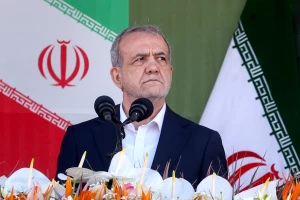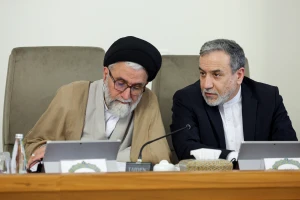Israel calls on the UK, Germany and France to impose earlier snapback sanctions on Tehran

The Israeli government has called on the European E3 powers, Britain, Germany, and France, to impose their “snapback” sanctions on the Iranian regime ahead of the October deadline.
Referring to the 2015 nuclear agreement between Iran and the Western powers, the snapback mechanism would be reinstated when the agreement expires in October 2025 if the Iranian nuclear issue is not solved.
The Israeli Foreign Minister Gideon Sa’ar discussed the issue earlier this week with his French and German counterparts on the sidelines of the summit for European Union foreign ministers.
Israeli Prime Minister Benjamin Netanyahu has reportedly also raised with various world leaders the topic of new sanctions on Iran.
“All the previous excuses not to trigger the snapback no longer apply,” a senior Israeli official told Ynet News on condition of anonymity. “They used to argue that Iran would escalate uranium enrichment from 60% to 90% if we acted – but that’s no longer relevant,” the official added.
The Israeli official argued that the Trump administration "now supports using the snapback mechanism. The Europeans want to explore this option as well.”
“Talks could begin in the coming weeks. The Europeans have signaled a decision by the end of August, but Israel believes it should happen sooner. Both Israel and the U.S. support the move,” the official assessed.
The news outlet Axios recently reported that the French, German and British foreign ministers told U.S. Secretary of State Marco Rubio that they intend to reimpose snapback sanctions on Iran if a nuclear agreement is not reached with Tehran by the end of August.
The French Foreign Minister Jean-Noel Barrot explained that the snapback mechanism is “justified in reapplying global embargoes on arms, banks, and nuclear equipment that were lifted 10 years ago. Without a firm, tangible, and verifiable commitment from Iran, we will do so by the end of August at the latest.”
The top French diplomat emphasized that the Iranian regime has violated its commitments to the 2015 nuclear agreement.
“It's a fact: Iran violated the obligations it took 10 years ago during negotiations,” Barrot said.
Iran has enriched uranium at 60%, near-weapons grade level, in flagrant violation of the 2015 nuclear agreement.
In May, Iran’s Foreign Minister Abbas Araghchi warned that Tehran would retaliate against the European countries if they decided to reinstate the snapback sanctions.
“Iran has made its position clear. We have officially warned all JCPOA (nuclear pact) signatories that abuse of the snapback mechanism will lead to consequences – not only the end of Europe's role in the agreement, but also an escalation of tensions that could become irreversible,” Araghchi threatened.
However, Iran’s negotiating position has been dramatically weakened after Israel and the United States last month severely degraded Tehran’s nuclear and military facilities.
The Israeli military and intelligence agency Mossad also decapitated most of Iran’s top military leadership and eliminated over a dozen senior Iranian nuclear scientists who were involved in Tehran’s clandestine nuclear military program.
Following Israel’s Operation Rising Lion against Iran, when Tehran fired over 500 ballistic missiles against Israel, there is growing international recognition that Iran’s missile program constitutes a serious security threat to the Middle East and the international community.
Some Iranian ballistic missiles can reach parts of Europe, and Tehran reportedly has ambitions to develop intercontinental missiles that could reach New York and Washington, D.C.
“They want to address Iran’s missile capabilities in the context of a potential new agreement,” the Israeli official assessed. “Until now, Iran has categorically refused to discuss the issue."
The IDF Spokesman Brig.-Gen. Effie Defrin explained that the Israeli military preemptive strike had prevented Tehran’s plans to triple its missile stockpile from 2,500 to 8,000 missiles.
“The regime’s plan to reach over 8,000 ballistic missiles was thwarted,” Defrin stated.

The All Israel News Staff is a team of journalists in Israel.
You might also like to read this:










